On October 15,2014 Facebook introduced its safety check service to the public, it’s initial aim was to mark people’s safety during natural disasters
That policy changed during the horrific Paris Attacks as Facebook provided the service for the first time for a non-natural disaster.
Facebook faced a lot of criticism for that move even though it seemed right and that’s because just a day earlier from the Paris attacks, Beirut, Lebanon’s capital Faced an equally terrifying terrorist bombing and not a single warning flag was raised by Facebook and it looked like Facebook was in total disregard of the middle east.
Facebook CEO Mark Zuckerberg addressed the topic in a Facebook post:
“Many people have rightfully asked why we turned on Safety Check for Paris but not for bombings in Beirut and other places,” Zuckerberg wrote. “Until yesterday, our policy was only to activate Safety Check for natural disasters. We just changed this and now plan to activate Safety Check for more human disasters going forward as well.”
Well this time, specifically on Friday 11, December 2016, an attack went down in Giza, Egypt on a Police checkpoint where 6 policemen were killed from a bomb blast.
Egyptians were surprised with their new Facebook notifications asking them to mark their safety, some of them didn’t even hear about the blast.
On the outside, it seemed like Facebook learned their lesson, the middle east is important to them as much as the next place, but did they really?
The Facebook response to such a minor event raises a lot of questions!
This article is not about blind criticism; 6 lives were taken today and that’s not something that should pass slightly.
But whose is it up to ? Facebook ?
We don’t think so.it shouldn’t be Facebook on its own the institution responsible for scaling these occurrences.
Did they check with the official authorities to confirm what happened? or was just based on media’s reports!
On their Official Safety check website, Facebook stated that their safety service will be activated by the community itself and not Facebook, which in a lot of ways isn’t what happened on Friday.
Yes, it was a disaster, but it doesn’t qualify enough to export such a bad image of the Egyptian state, the international communities and Egyptian’s relatives abroad are now Equally worried about the state’s future, Facebook took a minor event and made a major terrorist attack out of it blowing the whole thing out of perspective.
A move The Egyptian state didn’t need nor should it appreciate in such a critical time that it’s facing.
Egypt recently Free floated it’s currency and the economy is not looking good and such a slip From Facebook’s side might have costed Egypt more than what it seems
So, in the next few months, if the tourism in Egypt hits the ground, and foreign investments ran off, Egyptians have Facebook to thank.
Check source 1
Source 2



Leave a Reply